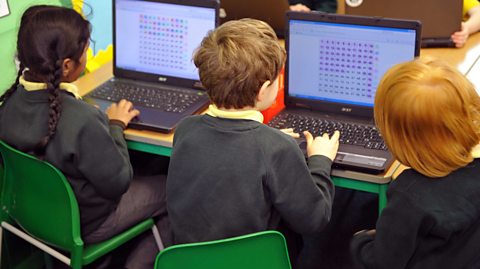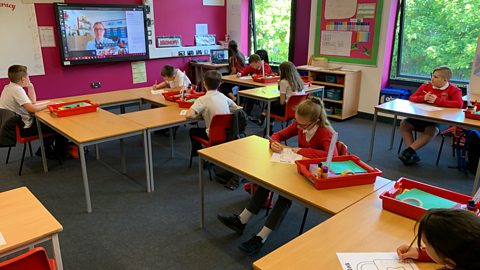
Virtual communication with parents and carers is here to stay for the foreseeable future. How, as educators, can we make parent consultations work most effectively?
By teacher Dr Emma Kell
IÔÇÖve been talking to parents and teachers on this subject and, whilst there are clearly some frustrations, there are many tips and tricks that can make virtual communication with parents work just as well as ÔÇô if not better than ÔÇô face-to-face meetings.
Now more than ever, in the midst of a global pandemic, relationships are everything and the lines of communication between home and school are more significant than ever.
The ability of educators and parents to see the positives in a period of challenge is always impressive. Here are a few that have been identified.

The advantages
Not having to jostle in a crowded hall
There is something uniquely stressful about the queues of parents at a physical parentsÔÇÖ evening and itÔÇÖs a nut that many schools have worked hard to crack ÔÇô often with little success.
There is often a sense of anxiety and irritation as parents wait to see the PE teachers, who for their part teach all 200 children in a year group.
To avoid this jostling and be able to access teachers from home or work is something that many parents really appreciate.

Timing, privacy and control
For school staff too, having had months to (by necessity!) get their heads around technology the tricks offered by online communication have distinct advantages.
Some really like the fact that you can have an online timer on screen showing how much time is left.
Slightly more controversially, some online systems actually throw the parents out after the time is up.
ThereÔÇÖs nobody listening in to your conversation and the parent can't see how many people are queuing behind them ÔÇô though the teacher has the potential to do so.
No travelling time
Many of us will remember the unique stress of being stuck in traffic in the knowledge that we have ten minutes to get to our first appointment and our child will never forgive us if we cause them the embarrassment of being late.
All of this is cut out with virtual meetings which, if necessary, can take place in a lay-by on the way home.
Many parents are asking that we learn lessons from this and keep this model as, at the very least, an option when the pandemic is finally over.
Safety and comfort
ParentsÔÇÖ evenings can be pretty intimidating affairs for both parents and teachers at times ÔÇô the smell of the science lab can be enough to take a parent back to their own fears about school.
Being able to access them from the safety and comfort of home has been a key advantage identified by all.

Top tips from teachers and parents
For all the advantages, there is no denying the nuances of in-person communication will be sorely missed ÔÇô be it the chance to identify, reassure and support a struggling parent or that moment of exquisite pride when you tell a parent their child is a joy to teach and a credit to them.
But there are many tips and tricks that teachers have suggested that you can use to get as close as possible to that level of quality communication.
Keep it personal!
IÔÇÖm going to take a leap here and say that the vast majority of parents are not losing sleep over their childÔÇÖs ability to use a frontal adverbial or solve a quadratic equation.
Whilst academic progress is, of course, important, this info could be shared in a written report.
The time a teacher spends sharing their observations on a childÔÇÖs sense of humour, anxieties, idiosyncrasies or gestures of kindness are the ones that mean the world.
Advance sharing of info
If you can create a system whereby information from both sides is shared in advance, this can really help to reassure and make the quality of communication more effective.
From instructions to accessing the online networks (ideally on video as well as in writing) to key information about the curriculum, the more information people have, the more time can be spent talking about the child as an individual.
One assistant headteacher has decided that next time, she will pre-record all of the ÔÇÿstandardÔÇÖ information so she isnÔÇÖt continually repeating herself ÔÇô another valuable tip that could benefit us way beyond this year.
ParentsÔÇÖ evenings can be pretty intimidating affairs for both parents and teachers

Build in breaks!
Having had a chance to try out their first virtual parentsÔÇÖ evenings, many schools didnÔÇÖt think to build in breaks for teachers ÔÇô itÔÇÖs a small thing that will make a big difference.
Uninterrupted screen time, as many of us have learned the hard way, can be exhausting and even teachers need the loo occasionally.
Some conversations may take longer than others so a chance to move away from the rigid five minute timers some schools have used might be worth considering.
A child-led approach
Finally, a simple yet potentially highly effective idea from a former Year 6 teacher, Helen Shakespeare.
Children tend to be far less intimidated by adults than by technology.
This activity could be done in class or, depending on your cohort and access to technology, at home.
The child makes a video of him or herself talking about their successes and their struggles and their hopes at school (with a series of structured questions in advance).
The parent can then watch this, either independently or with the teacher, and it can form the basis for the meeting.
This also has the advantage of increasing parental engagement (a challenge for many schools) because the child is more likely to urge the parent to be involved.
Every school and every family is different and so flexibility and creativity are key.
Whatever you do, IÔÇÖd urge schools to avoid cancelling parent consultations altogether ÔÇô on the rare occasions that this has happened, this has caused, at best frustration for families, and at worst a sense of feeling genuinely abandoned.
Quality communication and a sense of being ÔÇÿin it togetherÔÇÖ are more crucial than ever.


If youÔÇÖre a teacher in need of support, call free and confidential 24/7 emotional support helpline on 08000 562 561.
The │╔╚╦┐ý╩Í is not responsible for the content of external websites. By clicking the link to access the external website you will be redirected to a site controlled by Education Support. Please note that the │╔╚╦┐ý╩Í is not the data controller of the personal data you enter into the external website and it is not responsible for the services provided by any external organisation. When using an external website, you are subject to their Terms and Conditions and Privacy Policy.

Tips to help children regain lost learning. document
How teachers are dealing with the continuing disruption caused by Covid-19.

Online learning: Is it here to stay? document
How have schools around the country adapted to using online learning platforms during school closures?

Teacher Support Articles. collection
All our articles for teachers in one place, sharing peer-to-peer advice and personal experiences.
